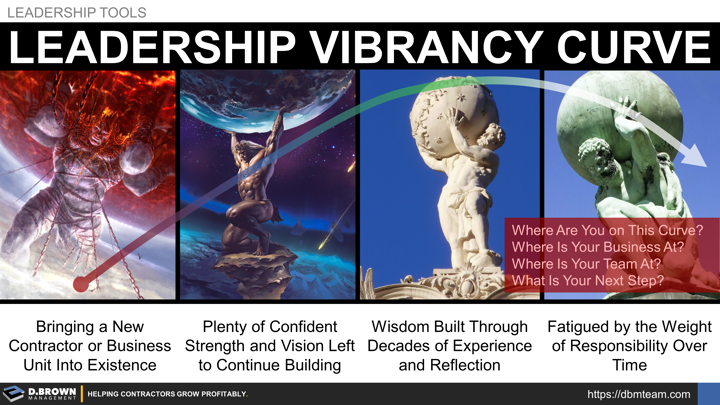What stage of growth is your business at?
Within that stage of growth, what phase of development is your management team at?
Within the arc of your life and career, which of these depictions of Atlas best describe you?
- Bringing a new business or business unit out of the ground with all the unbridled energy, competitiveness, and risk tolerance that requires.
- Plenty of confident strength and vision left to continue growing the business. Likely a little on the optimistically overconfident side - and this is exactly what is required to lead through this stage.
- Wisdom built through decades of experiences, both good and bad, combined with reflection and refinement. Likely a little on the over-conservative side regarding risk and reward, which is exactly what is required to lead through this stage.
- Fatigued by the weight of responsibility over time. Don't mistake this level of deep fatigue for being tired during the inevitable wins and losses at earlier stages of the career arc.
Make this evaluation for yourself and for your team.
What are your next steps?
As a contracting business evolves through various growth cycles, it requires very different types of leadership skills. This means that leaders always have to be changing and developing themselves and those around them. Leaders have to also be incredibly self-reflective and rigorously assess themselves and those around them on whether they still have the desire, runway, and skills to lead through the continual stages of growth.
We have the opportunity to get to know many contractors. The contractors that outperform for multiple generations have a culture and processes that keep the leadership pipelines vibrant. They are thinking about succession while they are in their 30s and early 40s. They are grooming others constantly. They are starting to execute succession plans while still in their 40s and early 50s to keep the pipeline vibrant.
For what it is worth, we have NEVER seen a succession deal fall apart due to financing or deal structure. Those may have been the cited reasons, but in every situation that we have seen it came down to a talent issue including both cultural and capability gaps.

